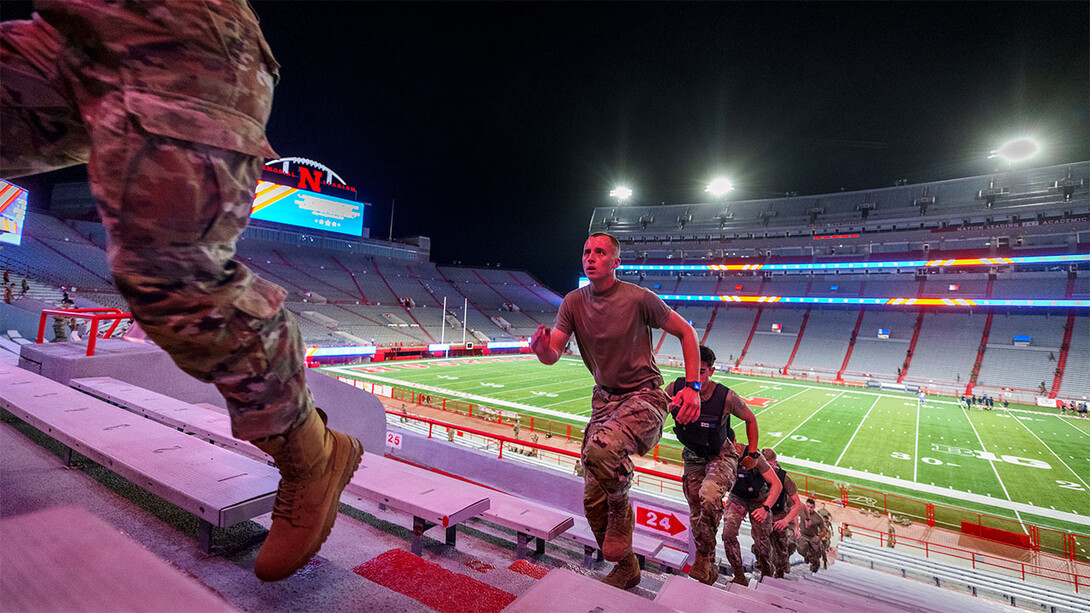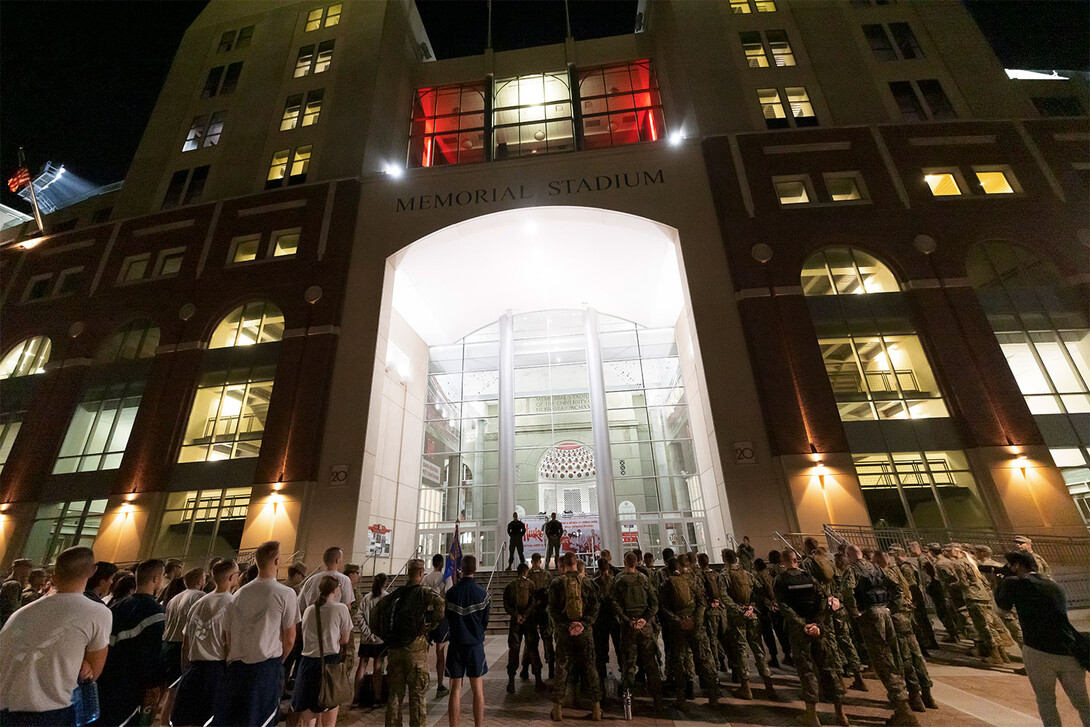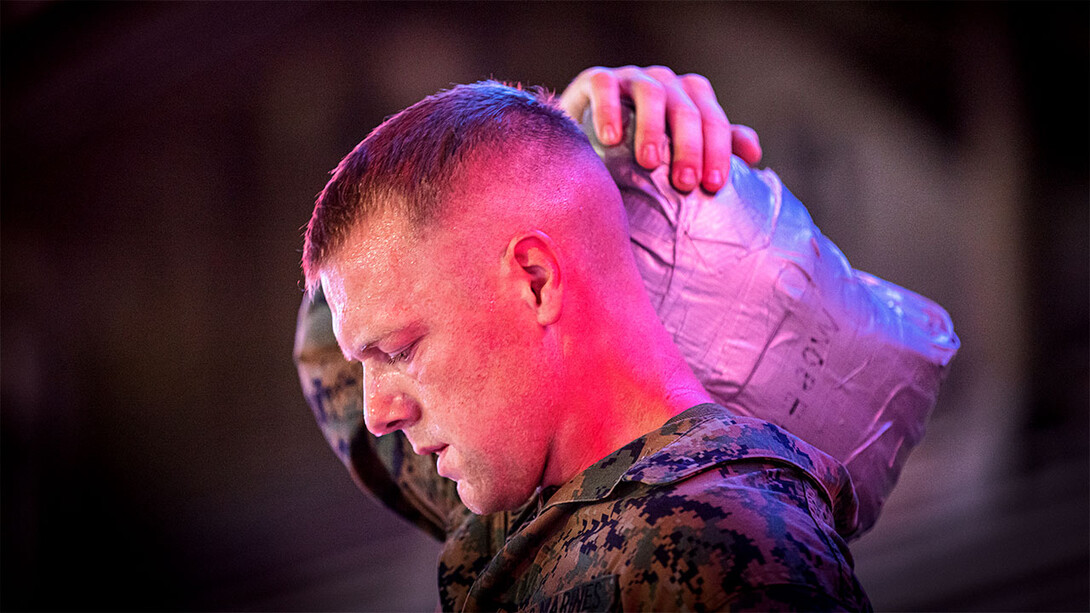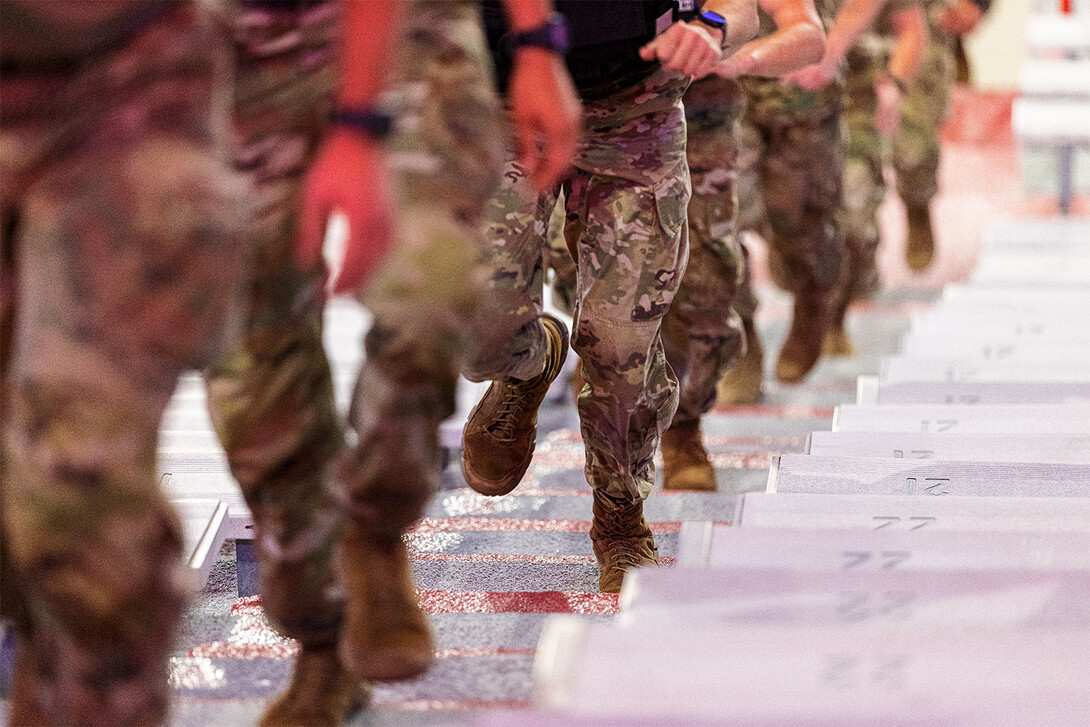
Smoke billowed. Screams echoed. Confusion reigned. Yet in they went. Up they climbed.
On the morning of Sept. 11, 2001, the 110 stories of New York City’s Twin Towers would mark the final chapter for the hundreds of first responders who dared to scale stairwells in the hope of rescuing thousands trapped amid steel and concrete and flame.
Twenty years later, in the low-60s chill of a pitch-black Sept. 9 morning illuminated by the lights above Memorial Stadium, University of Nebraska–Lincoln ROTC units and local firefighters paid tribute by traversing 2,200 steps — roughly the same number first responders faced on 9/11.
Initially, the stadium’s silence was broken only by the soft echoes of black boots on red stairs and the breathing of those willing themselves against fatigue to honor the fallen: 343 FDNY personnel, 23 NYPD officers and 37 officers of the Port Authority.
“You want to do them justice,” said Capt. Troy Scharfen, a Marine officer instructor with Navy ROTC. “Even though I wasn’t a firefighter, reading those stories, there are lessons that I can apply to my midshipmen. We want to honor those people, first and foremost, and also carry it forward with the 18- and 19-year-old kids, teaching them what these men and women did.”

Roman Montes, a junior in management from Lincoln, was just 6 months old when the towers fell. But his perspectives on the first responders, and the event, suggest that Scharfen’s aims are being realized.
“The firefighters went up way higher than this, so to stop (while climbing) is dishonorable to them,” Montes said before pointing toward a section of East Stadium. “That’s why we all go so hard. These guys up here are going hard with the freshmen who haven’t done this before, pushing them to their limit, because those firefighters did the same with a lot more at stake.
“The Navy and Marine Corps’ core values are honor, courage and commitment, and being a first responder, you have that bravery to go risk your life for someone you don’t even know. I find that really honorable.”
Like Montes, Midshipmen 2nd Class Ian Weninger was less than a year old on 9/11.
“I’m a little exhausted, but I know it could be a whole lot worse,” Weninger, a junior in construction management, said after finishing the last of his 22 trips up and down the stadium steps. “I could be wearing the flame pants, the steel-toed boots, the gas mask and all that jazz, which is significantly heavier and harder to wear than simple cammies.”
He wasn’t the only Weninger in attendance. Ian invited his father and U.S. Air Force veteran, Eric, to take part in the memorial stair climb for the first time. The Weningers lived in New York during 9/11, with Eric recalling the emptiness of the normally busy airspace in the hours following the attacks and the fire engine-led funeral processions that flowed through the city for months after.
“It’s just a real honor to do this with the midshipmen here at Nebraska,” Eric said.

As the ROTC units and Lincoln-area first responders continued their climb, the Husker marching band entered the stadium and, after some tune-ups, worked their way onto the field. For the next half-hour, the band peppered its practice with patriotic arrangements and songs that ranged from “My Hero” (Foo Fighters) to “Empire State of Mind” (Jay-Z featuring Alicia Keys).
Scharfen cited the band’s involvement as example of the esprit de corps that drew him to Nebraska.
“The relationship between the University of Nebraska and the ROTC units, UNLPD, Lincoln Fire and Rescue, is unbelievable,” Scharfen said. “The fact that we can go into one of the 25 largest stadiums in the world two days before game day, with the band playing, and run up the stairs is pretty great. We all appreciate it. It’s just an awesome experience.”
Scott Johnson, a member of Navy ROTC who has served in the Marine Corps for seven years, shouldered a 40-pound bag of sand wrapped in duct tape — a “pig egg,” in military circles — during each of his 2,200 steps.

“We can’t simulate that (experience), especially knowing that you’re potentially making a decision not to see your family again,” Johnson said. “It’s easy for us to come out here and run, so adding a little weight is nothing.”
But Marines, he said, do especially value and appreciate an essential aspect of the first responder mentality: a readiness, always, to go where they’re needed and do what they must.
“It’s not just readiness in a tactical or operational sense,” he said. “It’s readiness in a spiritual sense, being able to say, ‘I know what I’m willing to die for, and if it comes up, I’m going to do that.’ That’s what we try to foster. I don’t even know if I’m that way; I’ve never been tested in that way. But all you can do is promote readiness and be spiritually prepared for whatever comes.
“That’s what the first responders were. They were ready.”








